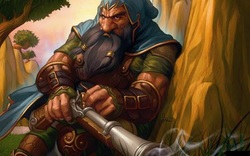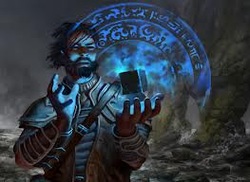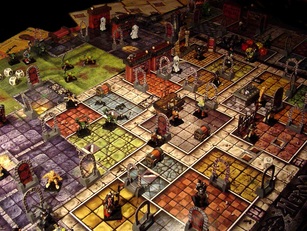 This week, we took a look back at when players are getting their feet wet for the first time. Whether you're a new gamer, or a seasoned veteran, DCR says: 1. Help whenever possible, but only when asked. This coincides with one of our Ten Commandments of Gaming, "encourage new players and invite them back." More experienced players should create an environment of openness to players who are learning. Much like a good college professor or a mentor, its about being a teacher/student. Don't let this go to your head, because this is only a temporary situation. A good teacher can have a student learning on their own and instill a sense of confidence in their students. Sometimes it may get to be a hassle to help new players learn a new skill, but it is so very worth it when a player finally "gets it". Answer questions for a new player, but encourage him/her to find answers on their own. Point them in the right direction. 2. It may sound tempting to know everything about a game system, but it isn't worth it. Don't bother. Start with the basics. Focus on learning the core mechanics and the other nuances of your game usually just fall into place. Let your knowledge grow naturally. There is no need to rush to catch up to the other players. It may even take a few years for this to come to fruition, but again, it's so worth it. 3. Find common ground. Experienced players should remember when they were first learning a game and what it was like for themselves. New players can aspire to find the characters that are right for them, and the methods in which they like to play. All players can swap war stories about their favorite moments. Every player, whether old or new, has a great opportunity to make friends that you may not otherwise have had a chance to meet. *Bonus XP: All of this ties into one easy statement: Drop the pretense of superiority! There is no need for such a counter-productive mentality. It's this common perception in the public eye that scares new players off. Do some real good for your favorite pastime and your friends, and just do a reality check. Help, learn, and don't sweat the small things.
0 Comments
 Gamer Forge Listener Email: Name Mark Jacobsen Comment A friend of mine is planning for a campaign in a colonial/pirate setting, and is planning on re-skinning crossbows as firearms, (i.e. light crossbow = musket, hand crossbow = flintlock), but I was wondering if there were already rules for such weaponry. Gamer Forger Response: Catch-a-Gun! Uggghhh. That sounds bad, just typing it. When you a crossbow just won't cut it for your pirate, DCR says: 1. The DMG says 1d10 with a times two critical multiplier. Fantasy settings often don't give much love to firearms, even Renaissance-era flintlocks. So, unfortunately, that's all the official answer gives us. 2. However, D20 Modern gives a host of options with your firearms. The books Ultramodern Firearms and D20 Weapons Locker give all the deets about all the guns you will ever need, including the stats and damage for the game. If you were expecting some huge damage rolling because it's "from the future", then prepare for disappointment. most guns comes up as 1d10 with a times two critical multiplier. Just like it says in the DMG. Most game systems give all the rules for firearms, and most just carryover from setting to setting. You just won't get the ridiculous damage rolling no matter where you go.  Gamer Forge Listener Email: Name Walter Smith Comment I’m just curious if any supplement out there includes an Animal Companion that is not, in fact, an Animal. As in the type. I mean that just any Druid of sufficient level can take; there are probably feats that allow you to get nonstandard Companions from other types, but I mean just ordinary “Animal” Companions. Bonus points if the Animal Companion in question is an Aberration, Dragon, Elemental, Magical Beast, or Plant, and thus qualifies for Rapidstrike. Super bonus points if you find a Construct or Undead, because that would just be weird. Gamer Forger Response: Catch-a-Familiar! Okay, just had to try again. That's the last one, promise. When your run-of-the-mill familiar just isn't sitting at the cool kids' table, DCR says: 1. Familiars can often be designated as any commonplace animal. Part of the point of the familiar is that, by themselves, they don't stand out very much. Most familiars confer a small, one-time bonus at the start of game play. Usually a small bonus to a skill or a small, special attack the familiar can do. It's what the familiar does over time is what makes them special. 2. If you want a familiar that is not only different, but almost diabolical, try a humunculous. It's a familiar that is constructed from the master's own blood. It behaves in the same way as a normal familiar does, just more...gross?  Gamer Forge Listener Email: Name Rick Bosco Comment Why are wizards and their ilk so restricted in their choice of personal armor in most fantasy roleplaying games? (...let alone novels etc.) Sure, learning takes up a lot of time, especially about such an arcane and cryptic subject as magic - but this is just a stereotype. Games and worlds could both easily be designed otherwise. Why is this stereotype so prevalent, and where does it come from? Gamer Forger Response: Does the clothes make the hero? DCR says: 1. Armor, in all actuality, is bulky and restrictive. There's nothing in the rules that says you absolutely cannot wear armor, it's just never recommended. A sorcerer's/wizard's movements are commonly the most important aspect of the magic. It's more dramatic that way, trust us. Also, mages become some of the most potent damage dealers around. So a heavy cannon that also becomes impossible to damage? Talk about unbalanced! 2. Lightning Rod! It's about the real-life repercussions of what you're doing. A fireball is very, very hot. When you wrap some meat in tinfoil and make it very, very hot, what happens? It cooks! Remember, a mage in heavy plate mail acts as a lightning rod when casting lightning spells, and becomes terribly frozen when using cold spells. However, you can double-dog dare a party member to stick their tongue to your armor right after casting "Touch of Frost" on yourself. Just saying. 3. Action heroes! Bruce Willis wasn't awesome in Die Hard because he was wearing heavy armor. Hell, he wasn't even wearing shoes! Star Wars Saga Edition best reflects the action hero mentality with an ever-increasing defense. So, we say NOT wearing armor has it's merits, so don't knock it. Unless, of course, you want to make a few extra coin by double-dog daring someone. *Bonus XP: To go the extra mile, take a few minutes and give your familiar a bit of personality. A simple quirk to draw a little more attention to it and have a little fun with it. But remember that the character is the main focus, so don't stress the familiar too much. Archemedes from the animated Sword in the Stone is a classic example of a familiar. Not very exotic. Quirky. Understated. Relevant. All the makings of a great supporting character.  Sweet! A series of easy to answer questions! Gamer Forge Listener Email: Name Robert Tiffany Comment I could have sworn that I read somewhere that the War Domain granted Improved Unarmed Strike when the god favored them, but I can’t find it now. Did I just imagine this, or is it an actual rule somewhere? Gamer Forger Response: So, when it comes to being EXTRA AWESOME in the eyes of your deity, DCR says: 1. This sounds like a house rule. Nothing wrong with that. A cleric is, by default, already favored by his/her deity. That's the source of their spells. If a DM wants to grant an additional favor for being an EXTRA AWESOME cleric, then who are we to argue? Gamer Forge Listener Email: Name Kevin Hardison Comment How does a mount interact with its rider in regards to Reflex saves? Example: •If a mount has a better reflex saving throw can the rider use its save instead of his own? •If a mount has evasion and the rider does not, does the rider gain the benefit of it? •Does the opposite apply as well? (rider with evasion on mount without, mount uses rider's save ) •Is the relationship between rider and mount important ( e.g. animal companion, special mount, familiar, 'bought the mount with gold', 'raised him from a pup', etc.)? Gamer Forger Response: When you can't quite figure out how your special mount helps you, DCR says: 1. When calculating your mount's NADS (Non Armored Defense Score), use either the typical saving throws for a standard creature of it's type, or the owner of said mount, whichever is higher. 2. Evasion is granted by the rider. A familiar sometimes grants Evasion to it's master, but not normally to a rider of a mount. Evasion must be gained by the rider all on his/her own. That being said, the bonus granted by the ability should only be used by the mount while mounted. Gamer Forge Listener Email: Name Hank Fielding Comment Degrees of cover and concealment are defined in the Player's Handbook (pp 280-281). There it discusses cover, superior cover, concealment, and total concealment. However, many powers and features elsewhere make use of partial cover and partial concealment, which the PHB doesn't mention at all! What do these new terms mean, and how are they different from regular cover and concealment? Gamer Forger Response: When you can't shake the feeling that someone is watching you, DCR says: 1. Ability to see vs. ability to hit. Sometimes they can be the same. You can hide behind a brick wall and can be neither hit nor seen. But if you can hide in a tree, chances are good you can possibly be hit, but not necessarily seen. Often, concealment warrants a percentage chance to miss outright, no matter what the attacker rolls to hit. Cover is often quantified as a bonus to armor class or defense. Concealment is described (usually) as partial or full, while cover is defined as half or total. Reference your corresponding rulebook for the proper bonuses to apply depending on the situation. Gamer Forge Listener Email: Name Jennifer White [email protected] Comment The Warlord ability Inspiring Word states that it allows a target to use a healing surge - does it require the target to use a minor action to use such healing surge? Or is it basically the equivalent to a healing spell assuming that target has a healing surge to spend? In other words, to use Second Wind (the only time I can use a healing surge in combat) I have to spend a standard action to do so...if my Warlord uses Inspiring Word on me do I need to spend an action to use a healing surge and if so, what type of action? Gamer Forger Response: What is war good for? Healing, kids! When your Warlord is doing his/her best to help, DCR says: 1. The Warlord is the one spending the action to apply the healing, not the target. The recipient only marks the healing surge off their page and applies the healing to their character. No further action is required. Go, you! *Bonus XP: For a fun example of cover vs. concealment, watch the film True Lies. Tom Arnold trying to hide shows just what it means to cover, but not conceal. At the end of Sherlock Holmes Game of Shadows, Robert Downey, Jr. gives a fine example of concealment, without cover. |
The GamerForge is DungeonCrawlersRadio’s most favoritist segment of the entire show. Have you ever had a boggling rules question that no one in the group can figure out? Write in to us and we’ll help try to solve it! Are you a Game/Dungeon Master who needs help squashing animosity at the table or dissension in the ranks? Perhaps we can help!
If you are in need of help, encouragement, or an uber devious way to get a TPK, we are here to help. No matter your needs, we’ll help you get more from your gaming! The Gamer ForgeWhere Players & Game Masters can come for valuable information to level up your game! Archives
August 2013
Categories
All
|
 RSS Feed
RSS Feed








